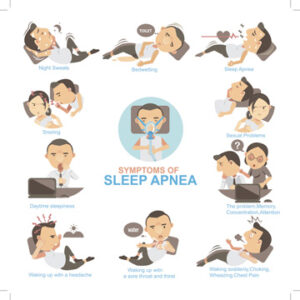 Santa Cruz, Scotts Valley CA
Santa Cruz, Scotts Valley CA
Obstructive sleep apnea is the most common form of sleep apnea, a sleep-breathing disorder characterized by loud snoring and choking noises due to frequent — and usually quite lengthy — pauses in breathing. The pauses in breathing disrupt a person’s sleep cycle, and the lack of oxygen to the body can result in serious health risks, such as high blood pressure, heart disease, stroke, pre-diabetes/diabetes, depression and anxiety. It also often results in severe daytime fatigue, which impacts concentration and focus and can have disastrous consequences if someone, for instance, operates heavy machinery or a motor vehicle.
With all the associated risks, it’s important to understand what sleep apnea is, what it looks like and how it’s treated. That’s the goal of today’s blog, chocked full of information compiled by our sleep apnea dentist in Santa Cruz.
How can I recognize sleep apnea?
Many people who have sleep apnea don’t realize it. It occurs when the muscles in the throat relax at night, causing the airway to collapse or narrow. This makes breathing difficult, if possible.
Snoring is the most common symptom of the sleep-breathing disorder. The sound is the result of air vibrating as it struggles to move through the relaxed tissue of a restricted airway. But just because someone snores doesn’t automatically mean they have sleep apnea. Pauses in breathing followed by choking sounds or gasping for air are tell-tale signs of sleep apnea.
Other symptoms of sleep apnea include:
- Excessive daytime sleepiness or fatigue
- Restless sleep or insomnia
- Morning headaches that feel like tension headaches
- Frequently waking to use the bathroom
- Difficult focusing or concentrating
- Memory loss
- Irritability, anxiety and/or depression
What are the risk factors for sleep apnea?
Being overweight or obese is the leading cause of sleep apnea because excess fat in the neck and throat area contributes to the airway’s collapse.
Other risk factors include:
- Being middle age
- Being male
- Having high blood pressure
- Having airway abnormalities such as deviated septum
- Using alcohol and/or tobacco before bed
- Having a family history of sleep apnea
How is sleep apnea diagnosed?
Most people who suffer from sleep apnea are unaware they have the disorder because they’re sleeping through the symptoms. It’s usually a sleep partner who brings it to the sufferer’s attention — and typically because that person is losing sleep due to all the snoring and gasping for air at night. Therefore, self-diagnosis — or at least a curiosity — typically leads people to their healthcare provider or to our sleep apnea dentist’s office in Scotts Valley.
Our dentist works closely with sleep specialists in diagnosing sleep apnea and developing a custom treatment plan. Dentists cannot make an official diagnosis of sleep apnea, but sleep specialists can after a sleep study conducted at home or in a sleep lab.
How is sleep apnea treated?
Sleep apnea can be treated in several ways, including through the use of a continuous positive airway pressure machine and mask (CPAP) at night. CPAP uses a steady stream of air to gently keep the airway open throughout the night, making it easier to breathe. A mask is attached by a hose to a machine that’s kept bedside.
While this is the most common treatment for sleep apnea, our dentist uses a more customized and less cumbersome method to treat mild to moderate cases of sleep apnea with great success. Oral appliance therapy consists of custom-designed clear plastic trays that fit over the teeth during sleep. The trays keep the tongue in position and reposition the lower jaw slightly forward to keep the airway open at night.
Only the most serious cases of sleep apnea may require surgery.
SLEEP APNEA TREATMENT IN SCOTTS VALLEY, SANTA CRUZ, AND LOS GATOS, CALIFORNIA
Snoring is more than just an annoying noise that happens at night. In many cases, it’s a signal that someone is suffering from obstructive sleep apnea, a disorder that can lead to serious health risks. At Ebrahimian Integrative Dentistry, we are trained to treat sleep apnea, and it’s our goal to help you and your loved ones in your household receive a better, quieter, more peaceful night’s sleep. If you believe you or someone you love has sleep apnea, call our office at (831) 824-5111 or reach out to us online today.



